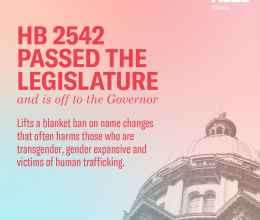
Transgender prisoners in Illinois prisons will have access to more humane, professional health care after U.S. District Court Judge Nancy Rosenstengel ordered the Illinois Department of Corrections (IDOC) to overhaul its practices and policies for providing treatment to prisoners with gender dysphoria. Judge Rosenstengel granted a preliminary injunction in the class-action lawsuit Monroe v. Jeffreys on behalf of five women who are transgender and detained in Illinois prisons, aimed at reforming the larger systemic crisis regarding how IDOC treats the hundred or more transgender prisoners in its facilities throughout the state.
Critically, the order requires IDOC to immediately cease the policy and practice of allowing its “Transgender Committee” (no members of which have any experience or expertise in treating gender dysphoria) to “make the medical decisions regarding gender dysphoria.” The order also requires IDOC to stop any delay in providing hormone therapy and to provide materials that facilitate prisoners’ social transition, including gender-appropriate clothing and personal grooming products.
The decision also ends the practice “mechanically” assigning housing based on “genitalia” and/or physical size and appearance.
“This is a sweeping victory for our clients, who have been subject to unspeakable harm by a Department of Corrections that has truly been deliberately indifferent to our clients’ suffering. We look forward to ensuring that IDOC complies with the order without any delay so that all prisoners who have gender dysphoria in Illinois will receive humane and professional treatment,” said Ghirlandi Guidetti, staff attorney of the LGBTQ & HIV Project at the ACLU of Illinois.
Judge Rosenstengel’s order also calls for:
- Allowing transgender prisoners access to health care providers who meet the competency requirements stated in the WPATH Standards of Care to treat gender dysphoria
- Allow inmates to obtain evaluations for gender dysphoria upon request or as a result of clinical indications
- A new IDOC policy to allow inmates medically necessary social transition, including individualized placement determinations, avoidance of cross-gender strip searches, gender affirming clothing and grooming items
- Training for all IDOC correctional staff on transgender issues, including the harms caused by mis-gendering and harassment.
Janiah Monroe, a plaintiff in the lawsuit, waited approximately three years after requesting treatment before her hormone therapy was initiated. Her treatment only began after several attempts to self-castrate. All of the plaintiffs experienced significant delays in receiving medically necessary treatment, while some treatments are being denied entirely. You can read their declarations in detail here.
“The Illinois Department of Corrections now has a clear path forward to provide a better baseline of medical care for individuals who are transgender and have gender dysphoria. We urge the IDOC Director and the entire department to move quickly to implement these court-ordered reforms so that its prisoners can receive the constitutionally adequate medical care that treatments they need to survive,” said Guidetti.
In addition to Mr. Guidetti, John Knight, Carolyn Wald, and Camille Bennett of the ACLU of Illinois, the plaintiffs are represented by Catherine L. Fitzpatrick, Jordan M. Heinz, Erica B. Zolner, Megan M. New, Sydney L. Schneider, Austin B. Stephenson, and Sam G. Rose of Kirkland & Ellis LLP, Brent P. Ray of King & Spaulding LLP, and Sarah Jane Hunt of Kennedy Hunt, P.C..



